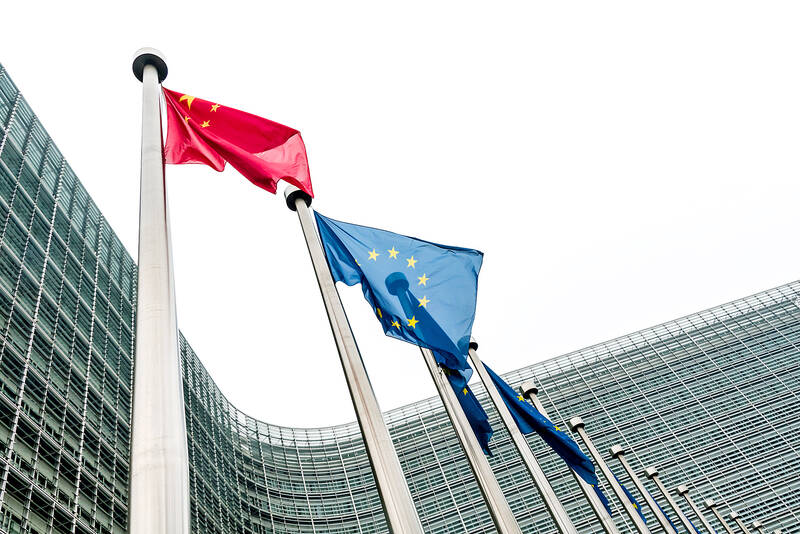The European Commission has proposed sanctions on seven Chinese companies accused of selling equipment that could be used in weapons for Russia’s war, the Financial Times (FT) has reported.
The companies, some of them already sanctioned by the US, are included in a sanctions proposal that would be discussed by European countries later this week, said an FT report published yesterday, citing a proposal it had seen.
Mainland-based 3HC Semiconductors Co (三合成半導體) and King-Pai Technology Co (金派科技), as well as Sinno Electronics Co (信諾電子), Sigma Technology Ltd (希舸電子), Asia Pacific Links Ltd, Tordan Industry Ltd and Alpha Trading Investments Ltd, which are based in Hong Kong, are on the proposed sanction list, the report said.

Photo: Bloomberg
The list would need to receive unanimous approval from the 27 EU member states before taking effect, the report said.
The proposal accused 3HC, a computer chip maker, of attempting to evade export controls and acquire US-origin items in support of Russia’s military or defense industrial base, it said.
There was also a proposal to sanction some Iranian companies involved in making and supplying drones to Russia, as well as to widen the range of banned exports to Russia, the report said.
Chinese Ministry of Foreign Affairs spokesman Wang Wenbin (汪文斌) told a news briefing in Beijing that his country’s economic trade with Russia was “completely above board.”
“If the reports you mentioned are true, the EU’s actions will seriously undermine China-EU mutual trust and cooperation, and deepen division and confrontation in the world,” he added.
“It is highly dangerous. We urge the EU not to go on this wrong path, otherwise China will take firm actions to safeguard our legitimate and lawful interests.”

Taiwan Semiconductor Manufacturing Co (TSMC, 台積電) would not produce its most advanced technologies in the US next year, Minister of Economic Affairs J.W. Kuo (郭智輝) said yesterday. Kuo made the comment during an appearance at the legislature, hours after the chipmaker announced that it would invest an additional US$100 billion to expand its manufacturing operations in the US. Asked by Taiwan People’s Party Legislator-at-large Chang Chi-kai (張啟楷) if TSMC would allow its most advanced technologies, the yet-to-be-released 2-nanometer and 1.6-nanometer processes, to go to the US in the near term, Kuo denied it. TSMC recently opened its first US factory, which produces 4-nanometer

PROTECTION: The investigation, which takes aim at exporters such as Canada, Germany and Brazil, came days after Trump unveiled tariff hikes on steel and aluminum products US President Donald Trump on Saturday ordered a probe into potential tariffs on lumber imports — a move threatening to stoke trade tensions — while also pushing for a domestic supply boost. Trump signed an executive order instructing US Secretary of Commerce Howard Lutnick to begin an investigation “to determine the effects on the national security of imports of timber, lumber and their derivative products.” The study might result in new tariffs being imposed, which would pile on top of existing levies. The investigation takes aim at exporters like Canada, Germany and Brazil, with White House officials earlier accusing these economies of

Teleperformance SE, the largest call-center operator in the world, is rolling out an artificial intelligence (AI) system that softens English-speaking Indian workers’ accents in real time in a move the company claims would make them more understandable. The technology, called accent translation, coupled with background noise cancelation, is being deployed in call centers in India, where workers provide customer support to some of Teleperformance’s international clients. The company provides outsourced customer support and content moderation to global companies including Apple Inc, ByteDance Ltd’s (字節跳動) TikTok and Samsung Electronics Co Ltd. “When you have an Indian agent on the line, sometimes it’s hard

PROBE CONTINUES: Those accused falsely represented that the chips would not be transferred to a person other than the authorized end users, court papers said Singapore charged three men with fraud in a case local media have linked to the movement of Nvidia’s advanced chips from the city-state to Chinese artificial intelligence (AI) firm DeepSeek (深度求索). The US is investigating if DeepSeek, the Chinese company whose AI model’s performance rocked the tech world in January, has been using US chips that are not allowed to be shipped to China, Reuters reported earlier. The Singapore case is part of a broader police investigation of 22 individuals and companies suspected of false representation, amid concerns that organized AI chip smuggling to China has been tracked out of nations such